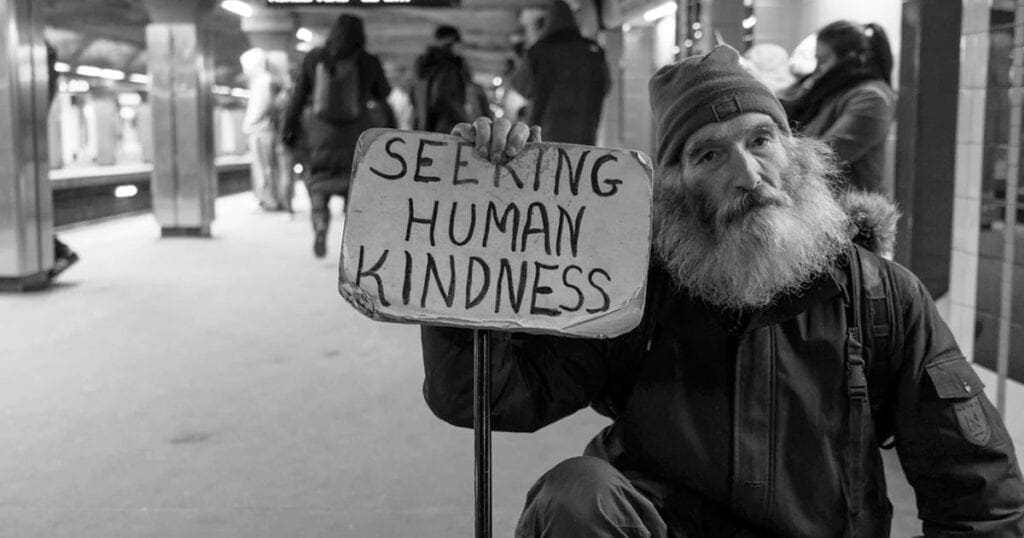Do you look people in the eye?
Certainly we do look people in the eye… especially when we are in a relationship with someone. But not always!
I realized that sitting waiting for the light to change. He looked like an army veteran. He had several days growth of beard and held a cardboard sign. “I’m homeless and hungry.” He often stands at this particular intersection. And I studiously avoid eye contact.
Then there is the elderly woman who looks to be in her sixties. She frequently stands at another intersection…also holding a cardboard sign. “I’m hungry.” However in this case she reminds me of my mother and my aunt. So I frequently pull over and give her a few dollars. Her name is Cathy, not Alice as my mother or not Tessie my aunt. I almost find myself looking to see whether she is out when the weather is either particularly hot or cold.
Two traffic lights and two different reactions. At one I avoid an encounter. At the other, I seek to encounter.
Have you ever felt invisible?
Then I read how Making Eye Contact with the Homeless is important.
Imagine a day where none of your coworkers would look at you, your family all ignored you when you tried to speak to them, and even strangers on the street went out of their way to avoid you.
How would that feel?
Now imagine it happening every day. After a while, homeless people who are subjected to this treatment begin to feel as if they were ghosts watching the world but not able to fully participate in it. If they try to strike up conversations, their words fall on deaf ears. They’re ignored, dehumanized, and invisible.
Seeing a homeless person as a person can be confronting. You may feel empathy for their situation that was previously held at bay by reductive stereotypes. You may feel anger at the injustice of inequality and be moved to execute change. Processing all these things in the moment can be overwhelming.
It’s much easier to just shut your eyes, close your ears, wall off your heart, and keep on walking by. But as much as homeless people need to be seen, the rest of us need to see them even more.

Pope Francis on Encounter
“The word, “encounter,” is one of Pope Francis’ favorites, popping up often in his public addresses and used 32 times in his apostolic exhortation, The Joy of the Gospel. He talks about encounter as an antidote to our “throwaway culture,” in which people who are seen as useless are cast aside: the unborn, the elderly, immigrants, the poor. If we encounter Christ in those people who are usually marginalized and get to know them, then we won’t be able to throw them away. You don’t ignore and neglect a friend.” It’s Time for a Theology of Encounter.
Suddenly I realized how I much I was caught up in a “throwaway culture” mentality. I realized how often I turn away from that basic form of encounter of “seeing” another person as Jesus, Vincent and indeed all our heroes in various branches of the Vincentian family.
It’s amazing how far a simple acknowledgment of another person’s presence can go toward helping that person feel seen rather than invisible and preventing dehumanization.
If you only ever do one thing to improve your interactions with the homeless people you meet, let this be it.
Seeing others as our brothers and sisters
The above post continues
The first time you see a homeless person as fully human, equal to yourself, and deserving of the same safety and security you enjoy is a unique experience. It’s also an experience that we need more people to have. Too many of our politicians and other powerful people see “the homeless” in aggregate without seeing the individual homeless people.
While homelessness is a complex issue and each person’s experience with it is unique, the first spark of understanding comes during that initial experience. Before friendship, before conversation, before anything else, the very first step on the road to understanding is eye contact. Allowing the other person to be seen and allowing yourself to truly see them is where it all starts.
So, the next time you see a homeless person, resist the urge to ignore them. Make eye contact. It’s quite literally the least you can do. [Emphasis added]
The least we can do
- Think about how often we avoid eye contact.
- Resist the urge not to make eye contact.
- Going beyond… Take time to read Making Eye Contact with the Homeless







0 Comments